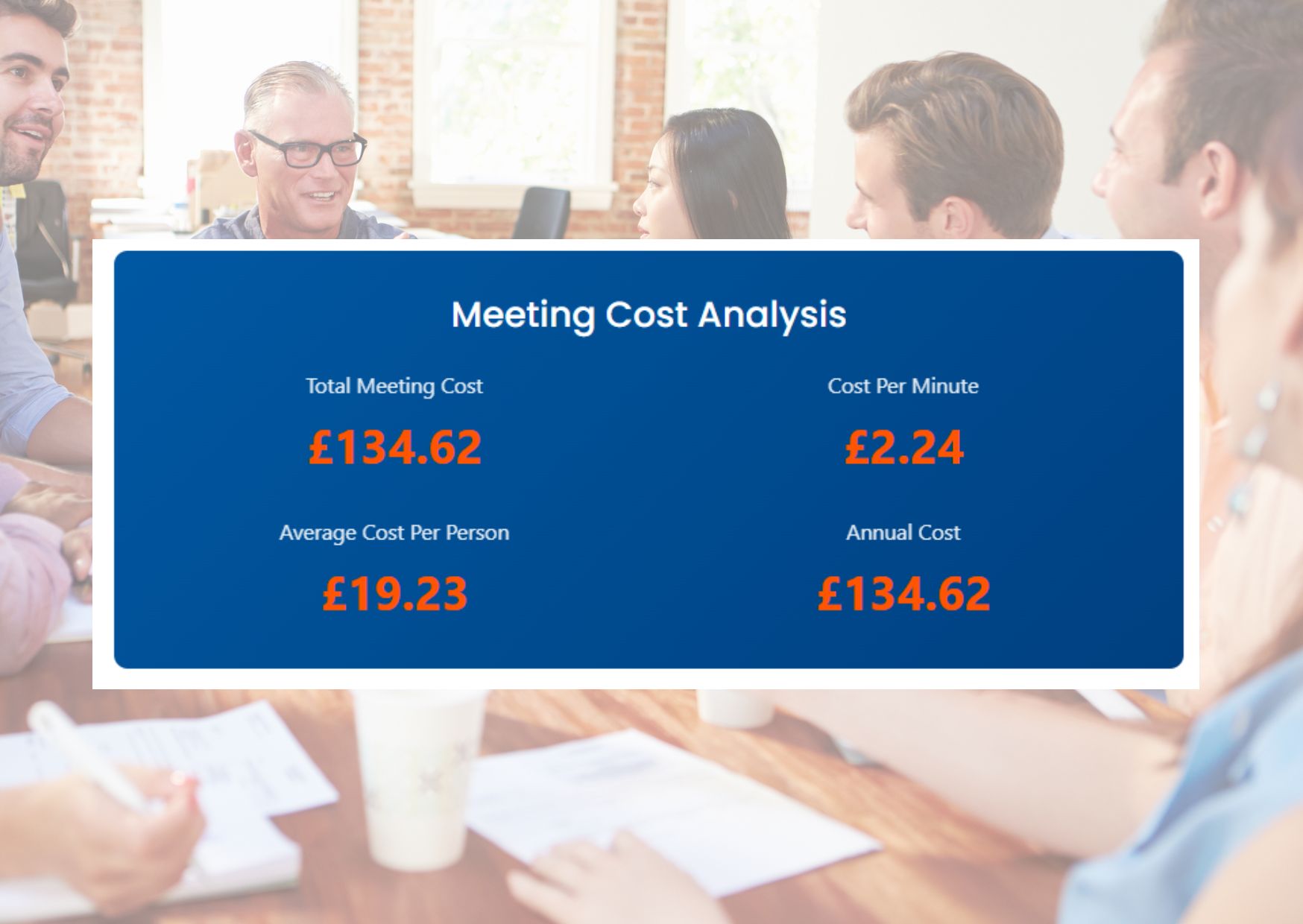Meeting Cost Calculator (FREE Tool)
Our meeting cost calculator shows you exactly how much every meeting costs before you hit “Join” on Zoom or Microsoft Teams.
Enter the meeting duration, frequency, and a couple of salary bands, and in seconds you’ll see the total cost, the cost per minute, and what a recurring session adds up to over a year.
Use it to tighten agendas, right-size invites, and protect focus time without killing collaboration.
If the numbers raise eyebrows, explore the practical tips.
Keep what works, trim what doesn’t.
And for your next meeting, why not explore our leadership or wellbeing workshops that make meetings more impactful.
Contents
Meeting Cost Calculator (FREE Tool)
What is a Meeting Cost Calculator?
What’s a Fair Meeting Cost? 3 Simple Rules of Thumb
Meeting Cost Calculator
How to Use This Calculator
This tool helps you understand the true cost of meetings by calculating the combined hourly rates of all participants. Perfect for making informed decisions about meeting efficiency and resource allocation.
- Select your currency – Choose between GBP (£), EUR (€), or USD ($)
- Set meeting details – Enter the duration in minutes and how often the meeting occurs
- Add participant groups – Create groups of attendees with similar rates (e.g., “5 developers” or “3 managers”)
- Enter rates – Input either hourly rates or annual salaries for each group
- Customize hours – Adjust weekly working hours if different from standard 35 hours
- View results – See the total cost, cost per minute, average per person, and annual projections
Tip: Group participants by role or salary band to save time entering individual rates.
Meeting Details
Participants
Meeting Cost Analysis
What is a Meeting Cost Calculator?
A Meeting Cost Calculator is a simple, accurate way to put a clear price tag on any meeting by combining who’s attending, how much they cost, and how long you’re meeting.
Enter headcount (or participant groups), choose a currency (GBP, EUR, or USD), and add either hourly rates or annual salaries.
The calculator converts salary to an hourly figure using working hours per week × 52.
Set the duration in minutes and, if it’s a recurring Zoom or Microsoft Teams call, pick a frequency to see the annualised impact.
In seconds you’ll get the total meeting cost, cost per minute, average cost per person, and yearly cost for repeating sessions.
Leaders and HR teams use a Meeting Cost Calculator to right-size invites, tighten agendas, and protect focus time by comparing the cost of a live meeting with the value of the decision at hand.
It’s a practical, data-driven way to improve collaboration habits, cut waste, and make smarter choices about when to meet and when an email or an update will do.
Why Meeting Costs Matter
Meeting costs matter because every hour spent in a meeting carries a real payroll price and an even bigger opportunity cost.
It’s time not spent serving customers, building products, or doing deep, focused work.
When you quantify meetings with a meeting cost calculator, vague annoyances turn into concrete numbers that leaders can act on, revealing how recurring check-ins quietly add up, how oversized invite lists inflate spend, and how 60-minute defaults drain momentum.
Visibility drives better behaviour, tighter agendas, shorter durations, fewer attendees, and clearer decisions, which in turn lifts productivity, reduces burnout, and protects wellbeing.
It also helps with budgeting and prioritisation, redirecting hours (and budget) toward high-impact work and targeted initiatives, so teams meet when it truly creates value.

What’s a Fair Meeting Cost? 3 Simple Rules of Thumb
When your meeting cost calculator shows a number, use these rough guidelines to decide whether to meet, shrink the length or attendees, or switch to email.
If the cost exceeds the value of the decision, don’t meet.
Ask the team: What’s the upside of deciding this live?
Revenue protected, risk reduced, hours unlocked?
If the meeting will cost £600 and the decision is worth £200, ship a short memo and gather comments instead.
Save live time for decisions where the payoff clearly beats the price.
Shorten by 25% as a default.
Most 60-minute meetings can land the same outcome in 45 minutes or less. In the calculator, drop the duration from 60 → 45 and watch the cost fall by 25% instantly.
Bonus: try 50-minute or 25-minute calendar blocks to create natural buffers.
Cut the room in half.
Invite contributors and decision-makers only. Everyone else gets the notes or recording.
Ten people at £50/hour for 60 minutes is £500.
Five people is £250. Same decision, half the spend.
Use pre-reads and a comment window so non-attendees can still influence the outcome without paying the live-time cost.
Use this meeting cost calculator as a guide, not a verdict.
Some meetings create value that’s hard to put into a monetary value.
In those cases, a live session may be worth it even if the immediate monetary return is unclear.
Balance the number you see with context, stakes, and long-term impact before changing or cancelling a meeting.
For example, taking an hour to put on a wellbeing workshop for teams can have tremendous value, but the cost calculator doesn’t take into consideration the long term benefits of this.
Make Your Meetings Count
Now that you’ve used the meeting cost calculator, keep the momentum with these practical resources and workshops:
- Leadership Team Meeting Ideas
- 15 Fun Wellbeing Activities for Team Meetings
- 10 Fun Wellbeing Games for Work
- 15 Fun and Engaging Town Hall Meeting Ideas
At Loving Life, we help organisations build healthier, higher-performing teams through practical leadership and employee wellbeing workshops that turn good intentions into daily habits.
If you’d like to reduce meeting waste, sharpen decision-making, and boost energy across your organisation, get in touch.
We can tailor a programme for your team and help you create a thriving workplace. Contact us to book a call and we’ll design something that fits your goals, budget, and culture.
Author –
Tyler Lowe – Health & Wellbeing Speaker
BSc Sport & Exercise Rehabilitation


